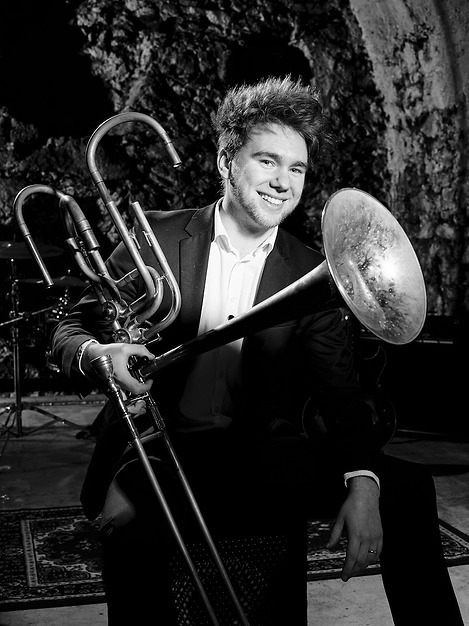 Paul Amann © Johannes Puch
Paul Amann © Johannes Puch
Paul Amann MSc. (*1993) is musician, technician, and researcher in the field of performance science for brass musicians. He studied music education (IGP) for trombone at the Gustav Mahler Private University Klagenfurt with Prof. Gerald Pöttinger and mechanical engineering at the Carinthia University of Applied Sciences. In 2022, he received the “Würdigungspreis des Bundesministers für Bildung, Wissenschaft und Forschung Österreich“ and in 2021 the digitisation grant Carinthia. Since 2021, he has been head of the smart lab in the Educational Lab at Lakeside Park, a fab lab for digital manufacturing technologies.
In his dissertation, he attempts to link technology and music and to investigate the individual sound production of brass musicians. The dissertation is part of the DigiMouth Project, funded by the Austrian Research and Promotion Agency.
Experimental investigation of physical performance variables of brass musicians using a sensor mouthpiece
When it comes to developing their skills and analysing playing errors, brass musicians are largely limited to their subjective perception. They can often only guess why they mastered a piece of music brilliantly the first time but failed the second time. This research investigates variables in the embouchure of brass players of different levels of expertise in order to better understand individual tone production. In combination with a low-threshold measurement system "digital mouthpiece" developed in this work, it is hoped that in the future, this will provide them with objective insight into individual tone production, facilitating the learning of brass instruments.
Several studies have shown the relevance of performance variables for tone production, such as lip force, air pressure in the mouthpiece and mouth cavity, the position of the tongue in the mouth cavity, etc., from which elementary physical models of brass performance have been derived. The number of participants in the experimental studies is small due to complex and time-consuming measurement set-ups. For the investigation of individual patterns in sound production in relation to the embouchure of brass players of different levels of expertise, which is the aim of this research, a larger number of subjects is needed.
To this end, this research is divided into the following steps: The development of a mobile digital sensor mouthpiece for low-threshold data collection of selected embouchure parameters, quantitative (via digital mouthpiece) and qualitative data collection (via questionnaire) from musicians of different levels of expertise for statistically meaningful results, and data analysis regarding the individual influence of embouchure variables on tone production.